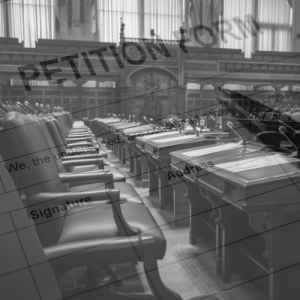Updated October 14, 2025

Initiative Petitions Filed Through Mid-October
Through mid-October, 140 initiative petitions (constitutional amendments) have been filed with the Secretary of State’s Office during the 2026 election cycle. 38 of those petitions were rejected after filing. Eleven others were withdrawn. To date, there have been four referendum petitions (amending state law) filed, and three were rejected.
The first step in the process is to file an initiative petition, followed by a public comment period, and then approval for circulation. The initiative will be put on the ballot in 2026, provided it obtains enough signatures during the circulation process.
So far, 88 initiative petitions have been approved for circulation in Missouri.
Recent Filings
Recent constitutional amendments have been filed to repeal the funding legislation for professional sports stadiums (Chiefs, Royals) and redirect that money to help offset Medicaid funding cuts by the federal government. Other constitutional amendments filed would affect individual rights related to marijuana and hemp.
A referendum petition filed redraws the U.S. Congressional redistricting map of Missouri.
General Assembly Places Two Constitutional Amendments on 2026 Ballot
The Missouri General Assembly passed two constitutional amendments in 2025, which voters will decide on in 2026. House Joint Resolution 73 would repeal the Right to Reproductive Freedom Initiative, which establishes the right to reproductive freedom, including the right to make and carry out decisions about birth control and abortion care. HJR 73 allows for abortions in cases of medical emergencies, fetal anomalies, rape, or incest. In the case of abortions performed or induced because of rape or incest, the abortion can only be performed or induced up to 12 weeks. The amendment also prohibits gender transition surgeries.
Another constitutional amendment to be on the 2026 ballot, HJR 23, would require Jackson County to have an elected county assessor. Currently, all charter counties in Missouri are required to provide for the election of a county assessor, except for Jackson County.
Several topics of initiative petitions have been approved to circulate for signatures. Many of those deal with the Initiative Petition process and to protect the process from changes by the General Assembly. A few of the IP-related constitutional amendments include:
- Prohibit the weakening of citizens’ direct lawmaking power by not allowing the legislature to make changes in initiative petition laws that would make it more difficult to propose or enact laws or amendments through the initiative process. Prohibit the legislature from changing any citizen-initiative law or constitutional amendment except if 80 percent of the House and Senate approve the change.
- Establish an independent citizens’ commission of 13 members, who are residents and registered voters of Missouri, to have exclusive authority to consider and adopt ballot summaries for all ballot measures.
- Citizens shall be allowed to promptly challenge misleading ballot titles, demanding that courts immediately require them to be completely unbiased, clear, and accurate. Pre-existing signature and voting requirements shall be maintained, including that a simple majority of votes cast statewide on the measure shall be sufficient to enact any law or amendment proposed by initiative petition.
- Allow initiative petitions to be signed electronically with statements of support by eligible voters.
Constitutional amendments, approved for circulation, dealing with business employees:
- Restoring Local Freedom Amendment, allowing cities of 10,000 or more population and counties to enact provisions of a minimum wage or living wage higher than but not less than any in state law or regulation, or provisions of minimum paid or unpaid days off or leave from work for sickness or illness, vacation, or personal necessity that exceed, but are not less generous than any in state law or regulation. Prohibit the state from overriding or preempting such local laws.
- Provisions of minimum paid or unpaid rest times for workers, meal periods during work shifts, or time off between work shifts that exceed, but are not less generous than any such rest time, meal period, or time off requirement in state law or regulation.
- Provisions of minimum notice of work schedules and notice of changes to work schedules that exceed but are not less strict than any such notice requirement in state law or regulation.
- Economic Rights Amendment, which covers employees’ rights, earned paid sick time, employees’ hourly wages, commissions, and various other provisions. Public employees and agricultural employees are exempt in some portions of the amendment.
- Add “Sexual Orientation,” “Marital Status,” “Pregnancy,” and “Gender Identity” to the list of categories protected from discrimination in housing, employment, and places of public accommodation.
Constitutional amendments regarding motor vehicle manufacturers, approved for circulation:
- Define any location operated by a motor vehicle manufacturer that markets and processes or takes orders for new motor vehicles as a dealership subject to franchise laws to prevent manufacturers from circumventing dealership regulations.
- Remove an existing exemption that allows motor vehicle manufacturers to sell directly to consumers without using franchised dealers.
Other topics of initiative petitions that have been approved for circulation include: Tobacco taxes; prohibiting minors under 18 years of age from possessing a firearm without parents’ or legal guardians’ consent; limits on the amount of rent charged for privately-owned residential rental property; prohibit people from holding elected office if they have been found guilty of or pleaded guilty to weapons offenses or certain violent sexual crimes; a valid marriage in Missouri shall exist only between a man and a woman.
Education-related initiative petitions now accepting public comments:
- Education shall be a fundamental right. It shall be the duty of the state and the General Assembly to establish and maintain adequate, thorough, and uniform high quality free public schools for people through age 20.
- Public funds shall not be used to benefit nonpublic schools, K-12, unless such benefits are equally available to the general public.
- Limit parental choice in education; eliminate existing programs that provide direct aid to students with special education needs by prohibiting the use of public funds for educational services provided by nonpublic schools; define most charter schools as nonpublic unless approved by voters or school boards before June 30, 2025, with limited exceptions for disability services.
Initiative Petitions in Court Regarding Summaries on Three Issues
In July, the ACLU of Missouri and Stinson LLP filed a lawsuit against the Secretary of State for certifying an intentionally misleading and inaccurate summary statement and fair ballot language for a measure that would overturn the recent voter-passed constitutional protections for reproductive freedom. The measure, placed on the 2026 ballot by the legislature in the form of House Joint Resolution 73, failed to inform voters that, if passed, it would eliminate the fundamental right to reproductive freedom; abolish explicit constitutional protections for prenatal care, childbirth, postpartum care, birth control, and respectful birthing conditions; and would overturn protections against prosecution for physicians related to pregnancy outcomes. Secretary of State Denny Hoskins rewrote the ballot language twice, and on October 7, a Cole County judge certified the ballot language and title for HJR 73.
Two initiative petition campaigns seeking constitutional protections for public education sued Secretary of State Denny Hoskins in August, alleging he crafted “deceptive and prejudicial” summaries that will appear on the ballot. According to the Missouri Independent, one campaign, called “the Missouri Right to Education Initiative,” hopes to amend the state constitution to declare education a “fundamental right.” The other, filed by an attorney with the public education law firm EdCounsel, would amend the constitution to prohibit public funding of non-public schools, except when it benefits students with disabilities. It would also label new charter schools as nonpublic. Both believe the Secretary of State’s summaries were written to deceive voters and sink their chances on the ballot next year. The Secretary of State’s office did not respond to a request for comment.
